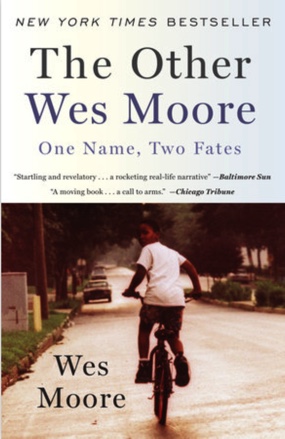
Common Reader Program reveals new book for 2020-2021
The Common Reader Program held a Big Reveal event April 28 via Zoom and announced Wes Moore’s “The Other Wes Moore: One Name, Two Fates” as the book selection for 2020-2021.
“The Other Wes Moore” tells the story of two kids with the same name, with similarly difficult upbringings in inner-city Baltimore, and the direction each’s life took as adults.
“[The book] explores institutional inequality and economic precariousness through the diverging paths of two young men,” said Anne Gessler, lecturer in humanities and chair of the University of Houston-Clear Lake (UHCL) Common Reader Program. “The committee felt it was a compelling and accessible narrative that will provoke thoughtful student discussions around race, class, and citizenship.”

Photo courtesy of Penguin Random House
The UHCL Common Reader Program was established in 2014 as an extension of the First-Year Seminar Program, designed to cultivate critical thinking and engage discussion about significant social concepts.
Central to this aim is the study of a common text, carefully chosen each year by the Common Reader Committee and incorporated into the First-Year Seminar. The text also inspires various open events hosted by the Common Reader Program throughout the year.
“A committee of students, staff, and faculty from all four colleges select the text that is studied in the First-Year Seminar as well as across the college during the academic year,” Gessler said. “It also programs events that relate to the common reader text and challenge community members to reflect on what it means to participate in civic life.”
Each year’s selected text presents multiple or differing perspectives on issues like race, gender, class and citizenship, and poses thought-provoking questions to stimulate intellectual conversation and depth in learning for all Common Reader participants – including students enrolled in the First-Year Seminar.
Director of the First-Year Seminar, Wanalee Romero, said that one aim of the First-Year Seminar is to introduce and transition first-time college students and transfer students into university study at UHCL, and to promote intellectual readiness for college success and beyond.
Romero said how students practice and improve their critical thinking skills throughout the course by considering real-world circumstances from many different perspectives and academic disciplines.
“One of the ways that we do that is that we read the book selected by the Common Reader Committee throughout the semester,” Romero said. “Students hone their critical thinking skills by reading, writing about, and talking about the book selection. I am particularly excited about next year’s selection because this book has been selected as a finalist by the committee for several years. The book’s focus on the ways that structural racism can confound one’s attempts to improve one’s lived reality is at once profound, frustrating, and somehow hopeful.”
The book succeeds “Spare Parts: Four Undocumented Teenagers, One Ugly Robot, and the Battle for the American Dream” by Joshua Davis, which was the common reader text selected for the Learning Framework’s 2019-2020 academic year.
“‘Spare Parts’ charts the lives of four Mexican-born teenagers,” Gessler said. “Despite struggling with financial hardship and the threat of deportation, they win a national underwater robotics competition.”
The book presented themes of immigration, education, technology and citizenship.
Gessler said that last year’s common reader selection was “[i]n keeping with UHCL’s identity as a Hispanic-Serving Institution.”
Alex Opekun, a student completing his First-Year Seminar at UHCL and one of the presenters in the Big Reveal event, shared his experience with the Common Reader Program and this year’s book “Spare Parts.”
Opekun described the structure of his studies throughout the course, explaining how he and his classmates would read assigned passages from the book along with other assigned articles, summarize the selections and craft questions that corresponded to the readings.
“In class, we enjoyed face-to-face discussions where we discussed our thoughts on both materials and responded to each other’s questions,” Opekun said.
Opekun acknowledged the Common Reader Program’s aim to invite participants to think critically about important issues.
“More important than the issues, however, I learned to state my opinions confidently and directly, and I learned to listen critically to alternative points of view,” Opekun said. “With my colleagues, I explored the concept of a brave space, where participants agree to heartily and amicably debate controversial subjects and opinions.”
Emily Foster, another student presenting at the Big Reveal event, talked about her experience with the Common Reader Program in First-Year Seminar.
“[The Common Reader Program] can set up a good foundation for future college courses by allowing students to be able to articulate their opinions by applying learned information,” Foster said.
This year’s Big Reveal event was hosted via Zoom because of COVID-19 causing the closure of campus to non-essential personnel.
The announcement video for the new book was posted to the program’s website and social media accounts for those who were unable to attend. While the program usually hosts four to five events each semester, recent campus closures meant some changes in this semester’s event schedule, too.
“Because of the pandemic, we were only able to host or co-sponsor three events this semester,” Gessler said. “We had our Kick-Off Event in the beginning of the semester. In March, we co-sponsored an event with Drs. Rekha Subramanian and Christal Seahorn. Combahee River Collective’s Demita Frazier gave two days of invigorating Zoom talks about intersectionality and community coalition-building. Despite the unusual conditions, the events were well-attended.”
For more information about the Common Reader program, visit uhcl.edu/academics/first-year-seminar/common-reader.
